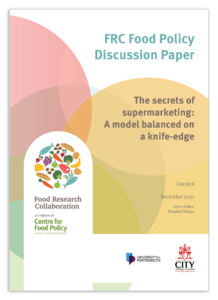What if supermarkets’ famously cheap prices weren’t simply a matter of ‘economies of scale’? A look at the research from the past 60 years suggests that this classic model doesn’t really work for the supermarkets. This report by Professor Lisa Jack, one of the UK’s few accountancy academics to focus on the food system, finds that the business model of supermarkets is on a knife edge: tiny, and heavily protected, profit margins applied to large volumes of goods keep the system running. Consumers benefit from a near-endless array of cheap food, but the system is left in a balancing act that could easily go awry.
Professor Jack’s analysis finds that adding scale actually adds to supermarkets’ expenses. In other words, supermarkets face the costs of running their businesses (stock, premises, IT systems, staff, enticing displays, sophisticated logistics), but need to keep prices down to keep customers coming through the door. The supermarkets therefore keep prices low by enticing customers to buy additional items and by looking to their suppliers. Bargaining power is the one real advantage that size and scale give the supermarkets but it risks putting financial and emotional burdens onto their suppliers.
One way supermarkets keep costs low is by charging suppliers fees for marketing and selling their products, generating ‘commercial income’ which can equal or exceed supermarkets’ bottom-line profits. Without the commercial income generated by charging supplier fees, British supermarkets would be running at or near a loss.
This supermarketing business model of low prices, wide choice, expert marketing and slim margins, although finely balanced and expertly run at the supermarket end, risks unbalancing the rest of the food system. This false economy of scale has unintentionally left us with a food system characterised by over-purchasing, over-eating, over-production and waste. Food is transferred to store cupboards in consumers’ homes and then left unused; empty calories are stored in our bodies; and edible food often ends up in bins.
Changing this system in effect asks the supermarkets to ‘unsupermarket’ themselves. Could they do it and stay viable? Could the wider food system withstand the upheaval? Do consumers want it? Would policy-makers risk it? We need to face up to these questions, as we try to envisage and move closer to a more climate-friendly, healthy, regenerative and equitable food system.


